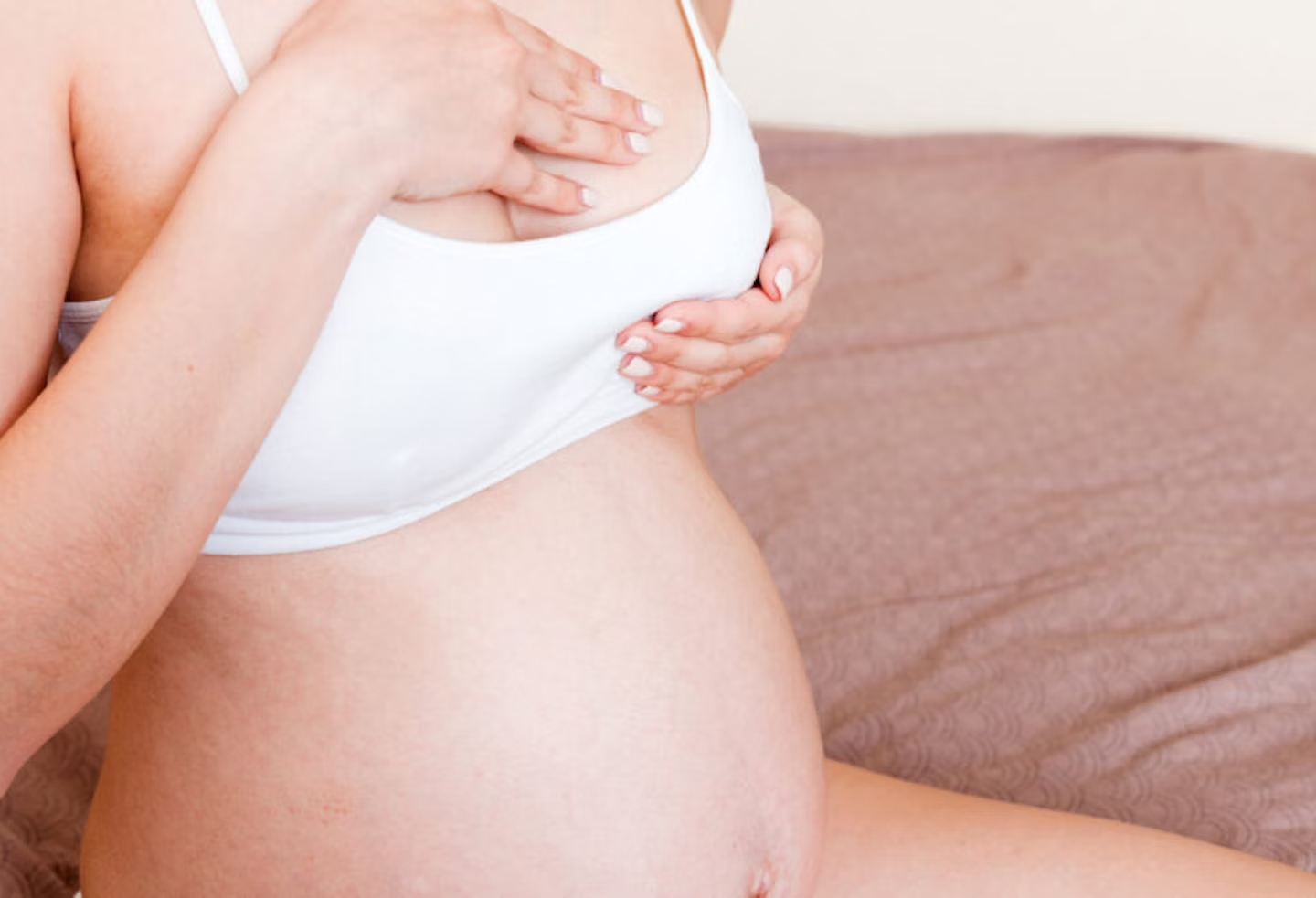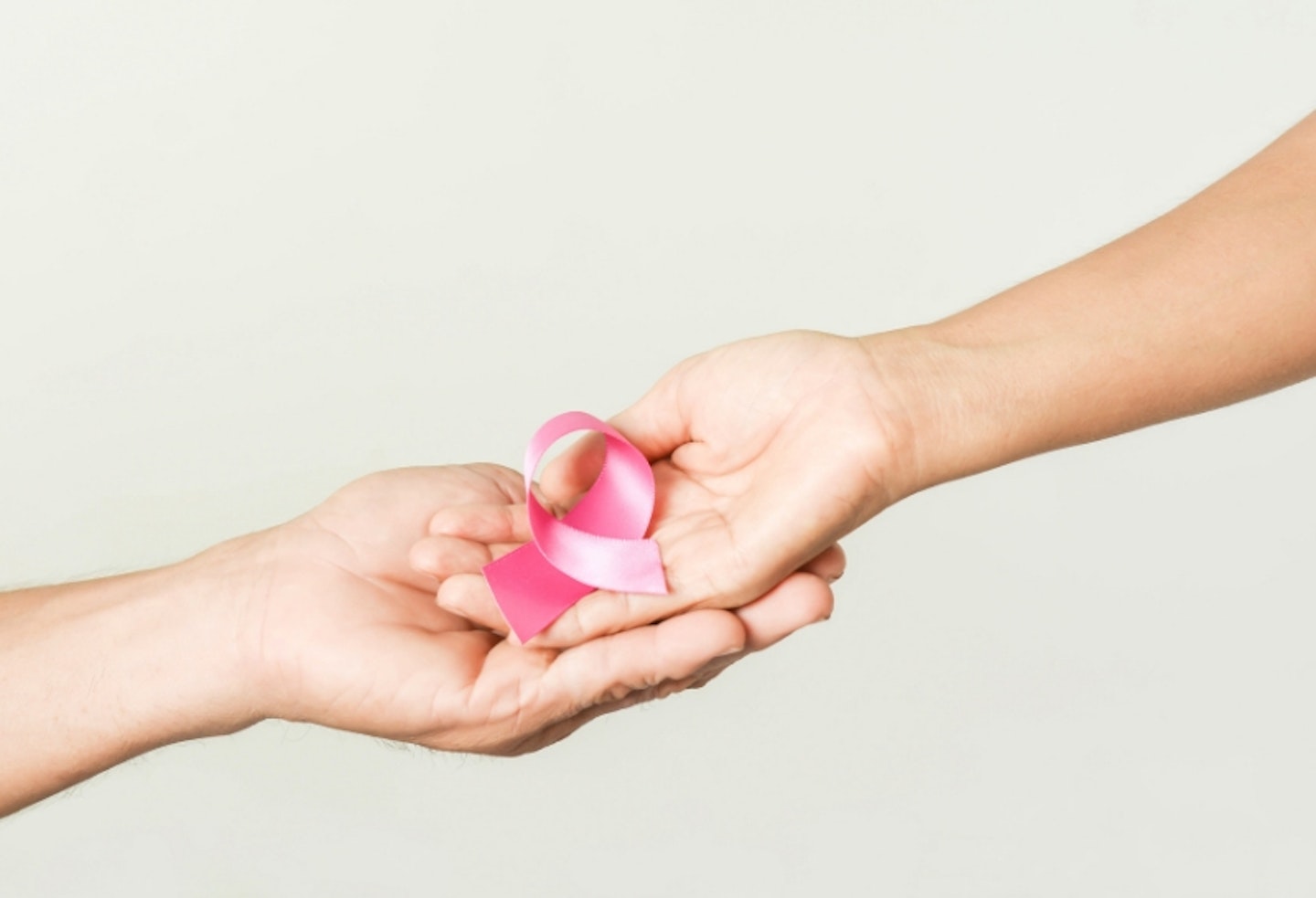It's incredibly important to be aware of the signs and symptoms of breast cancer at any time, but Breast Cancer Awareness Month is a great opportunity to get familiar with your breasts. Even if you’re younger or if you’re pregnant, breast cancer can still affect you so being aware of breast cancer symptoms can be vital to catching and treating it early.
Sadly, it's likely we all know someone who's been affected by breast cancer. In fact, according to Cancer Research UK, there are 56,822 new cases of breast cancer reported every year. That's more than 150 women every day. The numbers are scary but breast cancer doesn't have to be. With early diagnosis and treatment, survival rates are good and have doubled in the last 50 years in the UK.
But that early detection relies on you checking your breasts regularly and knowing the signs of breast cancer.
We spoke to Dr Penny Kechagioglou, Chief Medical Officer and Clinical Oncologist specialising in Breast at GenesisCare who shared her top tips on how to check your breasts and the breast cancer symptoms to look out for.
Breast cancer signs and symptoms
It's important to get to know your breasts so you can tell when something doesn't look right. The breast cancer symptoms to look out for are more than just a lump so by checking your breasts regularly, you'll soon notice if there are any changes.
Dr Penny’s warning signs:
• A change in your breast appearance, such as swelling, redness, dimpling (like orange peel), or a change in size or shape of one or both breasts
• A change in nipple appearance, such as inversion, discharge, a rash, skin puckering/dimpling or crusting
• Persistent pain in the breast or armpit
• A lump in the tissue of the breast or armpit area
What colour is breast cancer discharge?
Typically, the colour of discharge caused by breast cancer is an off-white colour.
This might be harder to spot however if you are breastfeeding.
Are cancer lumps painful?
Cancer lumps are often painless to touch, however they can cause pain as they grow and press against muscles or nerves.
If you have breast pain that comes and goes without a lump, it could be related to your periods or other factors and, as the NHS notes, "breast pain by itself is unlikely to be a symptom of cancer."

How to check your breasts
"The best way to check for breast lumps (hard, non-mobile, maybe fixed to skin or chest wall) is lying down comfortably and using the opposite hand, examine each quarter of the breast in a clockwise or anti-clockwise motion."
"The tail of the breast that leads to the armpit should be felt, as well as a deep feel in the armpit looking for enlarged, hard and fixed lumps (lymph nodes). Examination should be accompanied by looking at both breasts while standing in front of a mirror."
"Ideally, both arms should go behind the head and once happy with breast appearances, then lean forward and look for any skin puckering or change in breast shape."
"Don't forget to check both breasts, areas under both armpits and areas above both collar bones" says Dr Penny.
How often should you check your breasts?
It’s important we check our own breasts on a regular basis, but checking too often isn’t always a good idea.
Penny says, "Once a month is an adequate time for examination. More frequently it becomes an obsession. Do a good examination once a month and be aware of what is normal for you and present early when something doesn’t look right. If you see something isn’t right, you should come forward and see your doctor."
Due to our hormonal fluctuations, swelling and tenderness in the breasts can be normal which is why it's also recommended to check your breasts a week after your period ends to avoid feeling any hormonal swelling or tenderness and mistaking it for something out of the ordinary.
Breast cancer in pregnancy
Sadly, breast cancer can affect women at any stage of their lives and even in some cases, during pregnancy.
"If you’re worried it’s always best to see a specialist," says Dr Penny. "I would say the majority of the lumps that are found in pregnancy in the breast are part of the normal changes in the breast during pregnancy, but it’s important to have these checked in case there is an abnormality."
If you're going through breast cancer during pregnancy and need some help, there are a lot of breast cancer charities including Cancer Research UK and Breast Cancer Now that provide information for women in every stage of their lives, including women in pregnancy.
"Treatment can be offered during pregnancy and a treatment plan can be figured out so that the pregnancy can continue as normal to allow you to have a healthy baby," says Penny.
When to visit your GP surgery or hospital
If you've found one or more breast cancer symptoms, it's important to get yourself checked by a medical professional as soon as possible.
"Delaying your diagnosis could affect the prognosis and your chances of survival so it’s very important to seek help early" says Dr Penny.
While it can be frightening to make that first step, many of these symptoms can be caused by other conditions. Talking to your doctor as soon as you spot any symptoms can mean catching the cancer early and starting treatment as soon as possible.
What is secondary breast cancer?
Secondary breast cancer is where the cancer has started to spread to other parts of the body, according to Cancer Research UK. It's generally spread to other parts of the body through the blood or the lymphatic system and most commonly spreads to the lungs, brain, liver, skin, brain or bones. The symptoms of secondary breast cancer depend on where in the body the cancer has spread and treatment will be decided with a multidisciplinary team of experts.

How can I support breast cancer charities?
Whether during Breast Cancer Awareness Month or any time of the year, there are a number of ways you can raise money to help support Breast Cancer Charities.
Wear pink
It couldn't be easier. Whether taking part in bake sales or just going to work, raise money for Breast Cancer Now by donning your favourite pink outfit!
Head to Asda
Asda's Tickled Pink campaign supports Breast Cancer Now and CoppaFeel and this year features a t-shirt designed by Strictly star and breast cancer campaigner, Amy Dowden.
Coffee mornings or bake sales
A great way to bring people together, you can host a coffee morning and sell homemade or shop bought cakes and use the money raised to donate to charities.
Sponsored walks
These can often be done as seasonal events by charities themselves, where you sign up and ask friends and family to sponsor you to run or walk a certain distance.
Raffles
You can reach out to local business owners to see if they would be happy to contribute an item or service (such as free hair cut or afternoon tea), that you can raffle to friends and family.
More support
If you have been affected by cancer or you are worried about symptoms, there are many helpful charities and resources that can offer help and support throughout your journey.
• Breast Cancer Now - Breast Cancer Now are doing a lot to help out women affected by breast cancer and funding vital research.
• Cancer Research UK - Have you been impacted by a different kind of cancer? Visit Cancer Research UK for further help.
• CoppaFeel - This charity can provide you with more help when it comes to checking your breasts.
• Against Breast Cancer - They're on a mission to find a vaccine against breast cancer.
• Pink Ribbon Foundation - Find plenty of helpful information and support for those with breast cancer.
When is Breast Cancer Awareness month?
If you're wondering when Breast Cancer Awareness month is in the UK, mark your calendars for October. This month typically has people wearing pink and participating in fundraising activities to support cancer charities so it's a great time to get involved, have fun and raise money and awareness of a very important issue.
About the expert
Dr Penny Kechagioglou is a Chief Medical Officer and Clinical Oncologist specialising in Breast Cancer and Acute Oncology at GenesisCare. She graduated from University of Wales College of Medicine with Honours in 2003, then completed internal medicine training in the UK followed by specialist training in Clinical Oncology in 2010.
Lorna White is the Products Editor for Mother&Baby. After running the Yours magazine website, specialising in content about caring for kids and grandchildren, Lorna brought her expertise to Mother&Baby in 2020. She has a keen interest in a range of topics from potty training and nutrition to baby names and early development and has a wide range of experienced medical experts and professionals at her fingertips. In her spare time, she enjoys spending time with her two young sisters, dog walking and enjoying the outdoors with her family.
